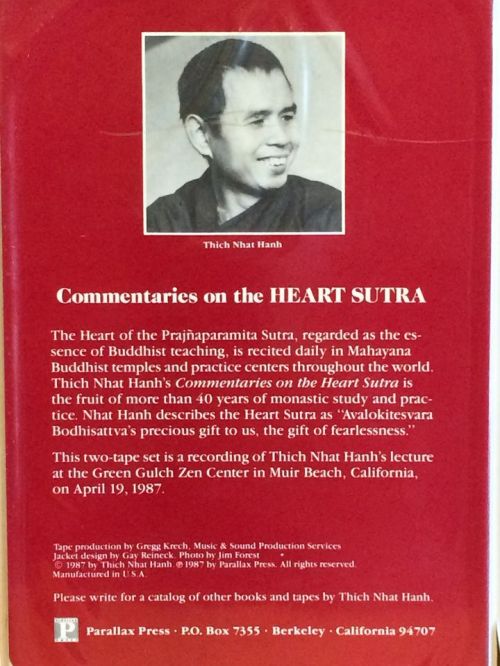With the Sangha
I meditate to decelerate my rampaging mind
I meditate to focus on clear image of you smiling in Tahoe
I meditate on words of Hanshan and Wang Yang-ming
I meditate to be able to be present to people in crisis
I meditate (sit still) less than time I spend writing
I meditate in hopes of tastes of joy
I meditate with no big deal expectations
I meditate to save this wrecked up world
I meditate to put together this fragmented Shimmelevsky
I meditate on what would be my good fortune—
You move back to St. Louis and we sit and meditate
On Saturday mornings 9:30 a.m. week after week
Good Citizens
Dear Friends in the Sangha,
I first encountered The Miracle of Being Awake (later published as The Miracle of Mindfulness) in 1982, when a monk from the Abbey of Gethsemani gave me a mimeograph of an English translation of a manual for social workers in Vietnam. In the 30 years since then, Thich Nhat Hanh has applied his simple message of mindfulness to many key areas of our lives: The environment, healthy eating, peacemaking, public service, anger, intimate relationships, among many others.
I read one of Thầy’s most recent books, Good Citizens: Creating Enlightened Society, in which he uses Buddhist fundamentals to sketch how we can become better public selves. Seeking a broad audience, neither religious nor not necessarily “spiritual” either, he invites people to consider the Buddhist pragmatism as found in the Four Noble Truths, the Eightfold Path, and the Five Wonderful Mindfulness Trainings. At 144 pages, the book can be read in a fairly short time; integrating it, however, may require many years of practice.
In encouraging people to become good citizens, Thầy leaves it to his readers to apply these teachings in our own contexts. It is there and then that we may learn a great deal about how good, mindful, compassionate citizens are characterized, at least when they dare to question the prerogatives of the powerful.
For example, here in Saint Louis, two of the most powerful corporations in the country have a comfortable home—Boeing and Monsanto. Their public relations departments will enthusiastically remind us that they are true benefactors to the community since they support our schools, universities, arts, and charities.
Obviously, Boeing is an integral part of the military-industrial complex, which enables U.S. militarism to be without peer in the world. Yet the corporation’s operations are linked to the violation of the first mindfulness training, which calls for reverence for life, and reads as follows:
“Aware of the suffering caused by the destruction of life, I am committed to cultivating the insight of interbeing and compassion and learning ways to protect the lives of people, animals, plants, and minerals. I am determined not to kill, not to let others kill, and not to support any act of killing in the world, in my thinking, or in my way of life. Seeing that harmful actions arise from anger, fear, greed, and intolerance, which in turn come from dualistic and discriminative thinking, I will cultivate openness, non-discrimination, and non-attachment to views in order to transform violence, fanaticism, and dogmatism in myself and in the world.”
Imagine, for a moment, that some local citizens aren’t so impressed by Boeing’s contribution to the commonweal. Suppose they want to help their fellow citizens become more aware of the suffering in the world and so begin a campaign to highlight Boeing’s products, which generates its profits. One part of such a campaign could be a mobile photo exhibition around the city to show the bodily effects of Boeing’s products on expendable peoples in the Middle East and West Asia.
Even assuming that such citizens do the above with some mindfulness, is it likely that the Boeing executives and employees, their allies in the university, and their friends in the community at large will look upon those people as “good citizens”? Or is it more likely that they would be seen as “anti-American” or “soft on terrorism”?
A “good citizen” in Thầy’s mindful sense may be a “bad citizen” from the standpoint of a nation’s dominant power interests. I recall first hearing the expression “a good German” back in the 1980s. Said ironically, it referred to those German citizens who were “good” in that they were obedient, quiet, and passive during the Third Reich.
In 1943 in the eyes of the Nazi state, Sophie Scholl and other young members of the White Rose Movement were considered “bad citizens,” nay, traitors, for distributing leaflets calling on their fellow German citizens to oppose Hitler’s tyrannous rule. To many around the world today, the White Rose members are viewed as among the most exemplary citizens in Germany from those horrible years.
“The real damage is done by those millions who want to ‘survive.’ The honest men who just want to be left in peace. Those who don’t want their little lives disturbed by anything bigger than themselves. Those with no sides and no causes. Those who won’t take measure of their own strength, for fear of antagonizing their own weakness. Those who don’t like to make waves—or enemies. Those for whom freedom, honour, truth, and principles are only literature. Those who live small, mate small, die small. It’s the reductionist approach to life: if you keep it small, you’ll keep it under control. If you don’t make any noise, the bogeyman won’t find you. But it’s all an illusion, because they die too, those people who roll up their spirits into tiny little balls so as to be safe. Safe?! From what? Life is always on the edge of death; narrow streets lead to the same place as wide avenues, and a little candle burns itself out just like a flaming torch does. I choose my own way to burn.”
–Sophie Scholl

Lost and Found
One morning at Café Osage
She told me all about it
How she had been so enthralled
Totally mesmerized by her I-Phone
It was her life-line
Her axis mundi
It increased her efficiency
It allowed her to be in touch
“Instantaneously,
Whenever I wanted!”
She fell asleep with it
It kept her company on the Metro
She used interesting apps
For intellectual stimulation throughout the day
But then in a daze of distraction
She left that sacred phone somewhere
And when she realized its absence
She went crazy looking for it
She looked in the post office three times
The clerks thought she was disturbed
“And I was!
What was I going to do?”
The sweats
The chills
The tears
The “I-can’t-believe-I-lost-it”
She couldn’t remember
Where she last saw it
Egad!
Holey-moley!
After several days
She went to the weekly sangha
And as sometimes happens in life
She walked out a different person
The next day
She got one of the last existing non-smart phones
She would use it as a land-line
Leaving it in her apartment when she left for work
I asked her “Don’t you miss it?
Why didn’t you just replace it?”
She smiled
“I’ve invested in something
Way more useful
For any situation I might find myself in
I use it —
If you can believe this!–
Even more than I used that I-Phone
I use it all the time”
I looked across at her
And in front of her
I didn’t see anything
She was “using”
“The best thing is
I can never lose this
It can never break
Never fall to its ruin in a toilet
When I go out now
I am free
Free! Shimmelstoy
I’m free!”
She was giggling
And I calmly inquired
“So, uh, can you tell me
What it is?”
“But you were there…
At the sangha, remember?”
“You mean that time we heard
Thay’s Dharma Talk on the Heart Sutra?”
“Yes, yes, yes!
After the sangha
I couldn’t get it out of my head
And so I kept it in my head
I wasn’t planning on doing this
But I kept repeating it–”
“You memorized the whole Heart Sutra?”
“No, no, no
The end of it
The great mantra
I said it that afternoon
And kept saying it that evening
I woke up the next morning mumbling it
I took a long walk in the park
Said it non-stop
For two hours
Now I say it upon waking
I use it before eating
I recite it walking to work
I definitely say it when I randomly see my ex
I find 100 times and places and moments a day
To take refuge in it
I’ve got so much more vigor now
I feel so connected to everybody and everything!
C’mon, didn’t you notice
There is something different about me? …”
Indeed, I did
Which is why I asked to see her that morning
“…I know I’m sounding like a zealot
But join me, Shimmelstoy, you know it:
‘Gate gate pāragate
pārasaṃgate bodhi svāhā‘”
She was beaming as she repeated it
Her joy was vibrating across the table
It was infiltrating my skin
In the most nonviolent way
After she finished her pancakes
And I my breakfast wrap
We went out on Olive
And did hugging meditation before we parted
I walked to my car
I was beaming too
If the Heart Sutra could liberate her
Maybe it could do something for me
A Single Blueberry
Erin Szopiak organized a mindful dinner for some of our friends: Everything for the menu had been grown locally, several of us helped prepare the meal in the Marty and Jerry King’s spacious kitchen, we savored most of the meal in calm silence, and, for dessert, Erin offered each of us a single blueberry, which we were to appreciate slowly, involving our sight, smell, touch, and taste. Erin invited us to the wonder of the here and now!
We’re All Works-in-Progress
“Dear Markel
You said I could share anything with you.
Here’s my first attempt with metta.
Joel
‘May Albert Schlie be full of loving-kindness.
May he be well.
May he know joy
That hypocritical fuck.’”
Train Wholeheartedly
Month off between semesters
14-hour days
Smiling at mile 18 of marathon
Straining to do five pushups
“We are pleased to accept you as a Corps member”
“We are unable to take many qualified candidates”
153 people came to the protest
Fund-raiser a bust
Acclaimed as a rock star
Denounced as a sell-out
Seven thousand miles from home
Stuck in traffic two miles from home
Unconditional parental love
Extremely conditional parental love
Ben and Jerry’s Chocolate Chip Cookie Dough Ice Cream
Triple espresso with a free extra shot
39 on MCAT
134 on LSAT
“A visionary work of astonishing perspicuity!”
“How is such adolescent drivel even allowed to be published?”
Hit on seven times in the space of three long city blocks
Totally ignored on the bus day after day
Dow Jones is having a great day
Portfolio takes a big hit
73 Likes
22 Friends
“BFF!”
“Don’t ever text me again!”
Perfect tan
Thinning hair
Don’t be swayed by external circumstances
This Is It/1
Sitting here with you
No agenda
Breathing in and out
No to-do list
Being calm and at ease
No strategic plan
Looking into your Cajun eyes
No rubrics
This page is part of my book, Dear Love of Comrades, which you can read here.
